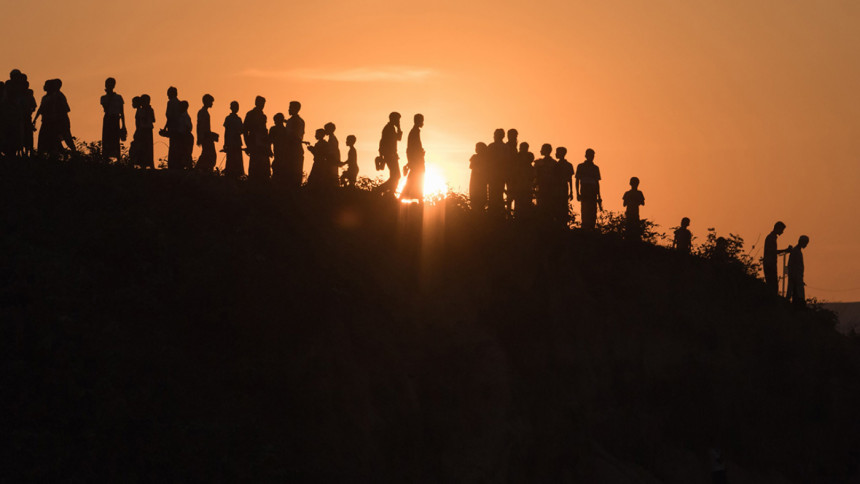Refugees settle down far away from camps

Amir Ali, his wife Amina Khatun, and their five children came to Bangladesh from Myanmar's Maungdaw around five years ago.
The family is now settled in Bandarban's Kaichtoli.
Recently, this correspondent visited the area and found Amir's family constructing a two-storey house on the land they settled on. He admitted that he didn't buy these 10 decimals of land.
In such rural, hilly areas, it is not uncommon for locals and others to claim empty patches of land and make a home there.
But the case of Amir is different.
He is one of the Rohingya refugees who crossed the border before the 2017 influx, and have started a new life in Bangladesh outside the refugee camps. And he doesn't deny this.
"Not just Amir's family, there are around 200 Rohingya families living in Haludia to Prantik Lake," said Md Siraj, a long-time local of the area, which falls under Bandarban Sadar upazila.
"Most of the Rohingya families who settled in the area managed local representatives and got their names included in the voter list," he said.
"The Rohingya families regularly get different government allowances, including that under the widow allowance programme and VGD [Vulnerable Group Development] and VGF [Vulnerable Group Feeding] programmes."
For those with the money necessary, it doesn't seem to be a problem to even get NIDs made.
Amir claimed, "My four sons and daughter have NIDs though my wife and I haven't got a national identity card yet."
Nur Nahar Begum, who came over from Myanmar's Buthidaung area several years ago, too, is now settled in Harin Mara para of Sualok union.
"We pay Tk 4,000 yearly as house rent to a local," she said.
"Among the 22 Rohingya families who settled in Harin Mara Para, most of them have NIDs already. My husband and I still haven't got the card as we don't have enough money."
The Daily Star obtained the copy of one Jafar Alam's NID, which was issued on November 2, 2017.
The birthplace of Jafar, now settled in Harin Mara para, is shown as Cox's Bazar on his NID. But his neighbour Fathema Begum told this correspondent that he is from Myanmar.
Jafar denied this, saying he is originally from Cox's Bazar and moved to Bandarban and had his NID made here.
Around 100 Rohingyas are settled in Harin Mara, said another local.
Habibullah, chairman of Naikhyangchhari's Dochari union, said, "There are around 300 Rohingyas in this union who came here a few years ago."
Seeking anonymity, a few locals of Dochari area claimed that Habibullah's parents also came over from Myanmar.
When asked about it, Habibullah said, "My parents lived in Cox's Bazar's Ramu area many years ago but I was born in Dochari."
Local sources, including several public representatives, said around 3,000 Rohingya families have settled in Bandarban district -- mostly in Naikhyangchhari, Lama, Alikadam, Rowangchhari and Bandarban Sadar.
Kafil Uddin, vice chairman of Alikadam, said around 500 Rohingya families have settled in the upazila in the last seven to eight years and there is even a village called Burmaiya [Burmese] Para here.
U Kaynue Marma, chairman of Sualok union, said while there were no Rohingyas here before 2007-2008, more than 200 Rohingya families now live in his area.
He added that around 50 of these families are registered in the area's voter list.
Jumlian Amlai, president of the Bandarban chapter of Parbatya Chattogram Forest and Land Rights Protection Movement, said, "Local administrations in the CHT are not only helping the Rohingya refugees settle in the CHT, they are also including them in the voter list and providing them with permanent residency certificates."
He added, "The state machinery is directly assisting the Rohingyas to settle in the CHT."
Mohammed Rezaul Karim, district election officer of Bandarban, said there is a syndicate which takes money from the Rohingyas for documents of citizenship.
"In 2019, we cancelled around 1,900 applications due to this Rohingya issue," said the election officer, referring to when they suspected that the applicants were not Bangladeshis, based on the documents submitted.
"Taking money from the Rohingyas, local representatives give them birth certificates," he added.
Contacted, Md Mahbub Alam, additional district magistrate of Bandarban, "We have no information of Rohingyas settling in Bandarban recently and those who are getting various government allowances might have come to this area long ago."
The Daily Star has found that the number of Rohingya refugees in all camps of Ukhiya and Teknaf of Cox's Bazar has actually decreased to 8.60 lakh as of July this year despite 76,000 children being born in the last three years.
It was about 9.57 lakh in December 2018, as per reports of the Inter Sector Coordination Group (ISCG).
Civil society members, local public representatives, and local non-government organisations working with the refugees say some Rohingyas have left the camps for good or some leave for certain periods of time.
Rezaul Karim Chowdhury, executive director of COAST Trust, which has been working with the Rohingyas since the 2017 influx, said Rohingyas are desperate to leave the camps and integrate into Bangladeshi society as the repatriation process continues to be delayed.
The administration has to take care of this issue before it is too late, he added.


 For all latest news, follow The Daily Star's Google News channel.
For all latest news, follow The Daily Star's Google News channel. 



Comments